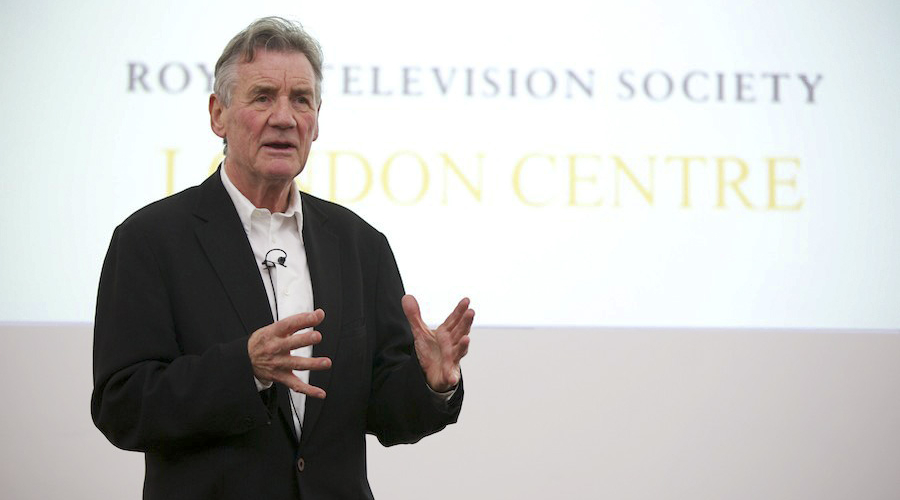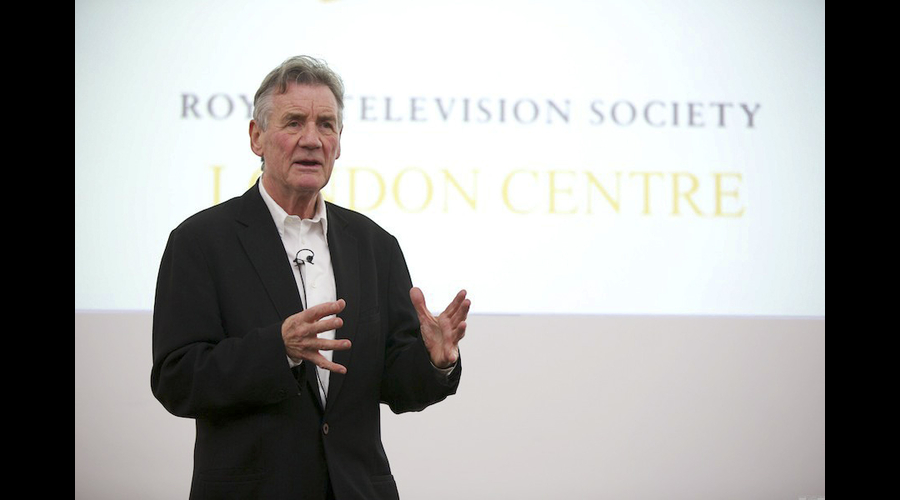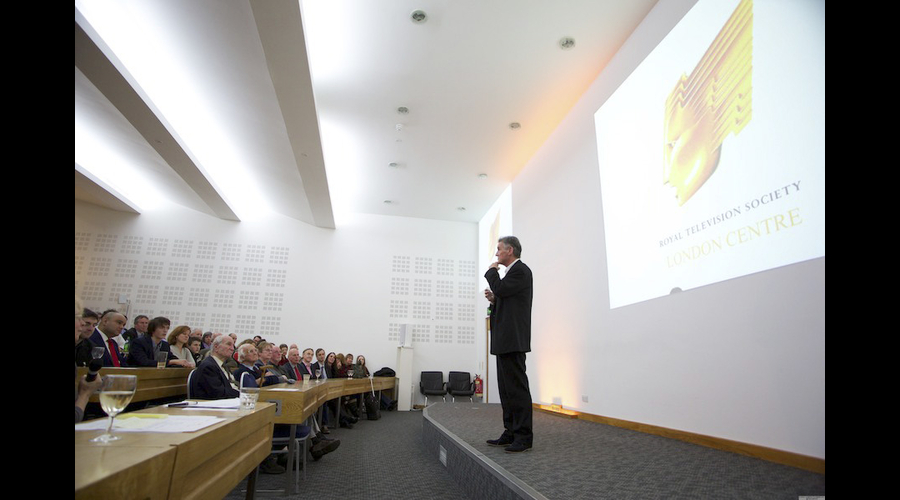Michael Palin has visited more than 80 countries as a BBC TV travel guide.
In the process, the programmes’ mix of sensational sights and oddball moments has consolidated Palin’s status as a national treasure.
To celebrate a quarter of a century of globetrotting, the recently resurrected Python was invited to give the RTS London Centre’s Christmas lecture, bringing his memories and a collection of stills with him.
His first travel series, Michael Palin: Around the World in 80 Days, was shot in 1988 and followed, as closely as possible, the route described by Jules Verne in his book.
Palin completed the journey with less than a day to spare, only to find his way barred when he tried to follow in the path of the book’s protagonist, Phileus Fogg, who had collected a wager from the Reform Club for circumnavigating the globe in just 80 days.
“All we wanted to do was get through the door and be photographed but they had a function on. So we ended the journey on the steps outside the Reform Club,” he recalled.
“That’s what clubs are all about. They’re not about letting people in, they’re about keeping most of the people out.”
Subsequently, Palin made: Pole to Pole (1992), travelling from north to south via Europe and Africa; Full Circle with Michael Palin (1997), in which he circumnavigated the lands around the Pacific; Michael Palin’s Hemingway Adventure (1999); following in the footsteps of the writer and adventurer; Sahara (2002); Himalaya (2004); New Europe (2007); and Brazil (2012).
The travel series have become firm viewing favourites yet Palin revealed to a sell-out audience at the Cavendish Centre in central London on December 11th that he was only the BBC’s fifth choice to present Around the World in 80 Days.
TV veteran Alan Whicker, journalist Miles Kington, author Clive James and even Noel Edmonds had turned down the job before Palin (approached by the BBC’s then head of documentary features Will Wyatt) accepted without hesitation.
As a child living in Sheffield, he remembered “from very early on I loved the idea of other places.”
“Just a mile away from my home were the Pennines and the Peak District, wonderfully exciting, adventurous landscapes with great crags and rivers,” Palin added.
“I wanted to travel and see all the parts of the world that were as dramatic as the Peak District and more so.”
In the 1950s only the wealthy travelled. The farthest place Palin visited was the Player’s factory in Nottingham on a school geography trip.
“Can you imagine that – an 11-year-old boy taken to a place which produces thousands of fags? At the end, they gave us 50 cigarettes for our parents and we all got ash trays,” he recalled.
By most people’s standards, Palin had already completed a lifetime’s career in TV before his globetrotting began.
With future fellow Python Terry Jones he wrote for the Ken Dodd Show, The Frost Report and children’s show Do Not Adjust Your Set, in which he also performed.
Palin appeared in some of the most famous Monty Python sketches, including “Dead Parrot” and “The Lumberjack Song”, before working on BBC2’s Ripping Yarns, again with regular writing partner Jones.
His film career included such titles as Time Bandits, Brazil and, of course, Monty Python’s The Life of Brian.
An enthusiasm for railways that started as a schoolboy train spotter led to a presenting role on the BBC series, Great Railway Journeys of the World, in 1980.
“I said yes, not because I thought it would be a good career move, but for the chance to see trains and steam engines,” he remembered.
In 1987, having completed crime caper A Fish Called Wanda, Palin found himself with time on his hands.
With no more Python films planned, he signed up for Around the World in 80 Days.
Only later did Palin found out why he had been chosen - albeit after four other potential presenters had declined the role.
“What I thought was a diversion from my main career [Great Railway Journeys of the World] had been the most important thing in getting me asked to do Around the World in 80 Days,” he said.
“And I’ve never regretted it – it’s given me an enormous opportunity to see the world and work with a great team of people.”
Hong Kong-born stills photographer Basil Pao has accompanied Palin on all eight BBC TV travel series.
Among his photos Palin showed the RTS audience were breath-taking shots of the Khyber Pass, Machu Picchu in Peru and the Sahara.
There were also Pao’s pictures featuring some of the stranger moments including the presenter washing an elephant, traveling on top of a train and milking a yak.
Palin was particularly pleased with his discovery of road signs in India with road safety messages such as: “After whisky, driving risky”; “Drive like hell –you’ll be there”; and “Better be mister late than the late mister.”
"Over the 25 years of travel, there are some places we were able to go to, which we just can’t now.
“Some of the areas in the centre of the Sahara, Mali, Niger, we wouldn’t be able to film there, and I’m almost certain [parts of] Pakistan,” he said.
As the world has become more dangerous, Palin and his crew have had to take more precautions.
“Health and safety is far more rigorous,” he said. “For Sahara, we had an anti-terrorist briefing that told us how to crash through a barrier if we were attacked.”
Palin, though, ignored some of the dafter requests.
“When I was in India we were going to ride an elephant and the BBC insisted that I wore a hard hat.
“I said 'No, I’m not doing that,'” he recalled. “You can’t wear a hard hat on top of an elephant – it would look ridiculous.”
Palin has encountered some hostility on his travels, but “far more rarely than you’d expect.”
He was in the North West frontier region of Pakistan shortly after the first Iraq war in 2003.
“There were people who wanted to pick an argument but they were quite pleased that we were there.
“There was a bit of finger wagging but I didn’t feel physically threatened,” he recalled.
On only one occasion, in Sudan when Palin and the crew were surrounded by an angry crowd and had to drive off quickly, had he felt uneasy.
“I’ve been far more frightened when, say, I’ve been in a light plane flying into storms than I ever was by people on the ground.”
The next venue for Palin is London’s O2 Arena, where the reformed Monty Python are performing in July.
Looking ahead, the presenter’s wish list of places to visit are Madagascar, Mongolia, more of China and the US and, not that it would be currently possible, Syria.
“When people ask me if there’s anywhere I’ve never been, the first thing I say is Middlesbrough.
“I just said it randomly the first time. People worry about why I haven’t been to Middlesbrough.
“Is there something about Middlesbrough? Of course, I can never go there now because it would spoil [the joke].”



